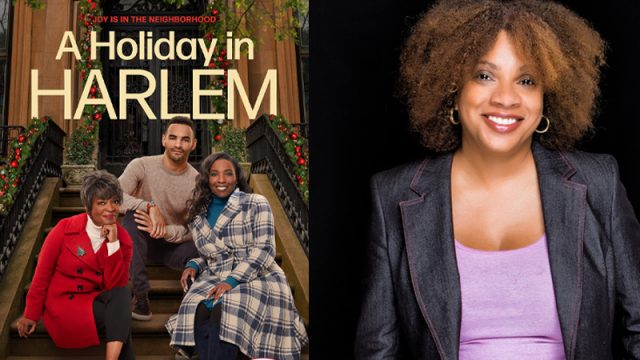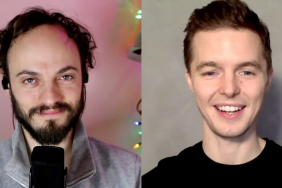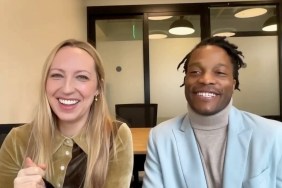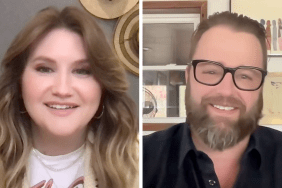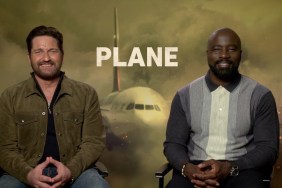ComingSoon was able to speak with writer Monique Matthews about her work on Hallmark’s A Holiday in Harlem.
Monique Matthews is a Los Angeles-based writer and director. Prior to this, Monique, a Harlem native, was an entertainment journalist and managing editor of a national hip-hop magazine. She has also been a guest panelist on NPR’s Tell Me More and more. Monique transitioned into filmmaking after graduating from the UCLA School of Film and Television. She has written for several studios including MGM, Walt Disney Pictures, and Paramount Pictures.
RELATED: Interview: Tall Girl 2 Director Emily Ting Discusses Themes, Highlighting Full Cast
Jeff Ames: What led you to become a writer?
I have always been fascinated by words, and I honestly believe writing found me. I remember writing my first book, as a class activity, in first grade. You know, when teachers give you four to five sheets of copy paper, with one colorful piece of construction paper, have you fold them in half, and craft a story. I believe I was about five or six then, and I was just awestruck by putting words together and watching how they transformed into a story on paper. I’ve been in love with the craft ever since.
How did you come up with the idea for the film?
Monique Matthews: It came to me while walking in my hometown of Harlem during Christmas 2019. New York City, and Harlem, in particular, can be so pretty. The architecture of the city is gorgeous, the people are beautiful, and the fashion, even in zero-degree temps, inspires fashion trends around the world. It snowed several days while I was home, making it a particularly white winter. And as I walked through my neighborhood, the characters started speaking to me, and the plot began to unfold from there. It was a true blessing to have this story come to me, and I am thrilled that Hallmark saw the vision, too. It was a dream to see it come to fruition.
What was the most challenging aspect of A Holiday In Harlem and how did you overcome that?
The schedule, by far, was the most challenging aspect. It was 2021, and we were one year into the pandemic. My producers called to tell me that Hallmark was interested. I had two weeks to put together a treatment. My producers and I then had a meeting with our development execs who loved the idea and sent me to draft. The catch: It was May, and if the movie were to receive a greenlight, the script had to be ready in a month to meet the production demands for Hallmark’s celebrated “Countdown to Christmas” release. This meant I had to write a working draft, not just a first draft, in three weeks. Most creatives know that, by definition, first drafts suck, but I had to figure out a way to make it work. I adopted a very focused schedule of getting up by 5:30am and listening to my Christmas playlist (I create a playlist for every script that I work on) during my morning walks with “The Girls,” my two Maltese. I used this time to organize my thoughts for the day. I would write in three, four-hour blocks, before taking a break, usually involving movement such as another walk, run or Peloton cycle class. Then, I’d shower, grab a quick bite, and get back to writing again before retiring for the night. In the morning, I started it all again. I had little to no time for family and friends.
RELATED: HBO Max’s A Christmas Story Sequel Adds Four Original Cast Members
Do you have any fun, behind-the-scenes stories about the making of A Holiday In Harlem?
The cast was absolutely amazing, and watching them bring my words to life made our 15-day production schedule a joyous experience every day. Olivia Washington, who plays our protagonist Jazmin, is one of the kindest and most giving actors I’ve ever met. Early on, in the casting process, we thought it would be a fun wink to the audience if the writer, who’s from Harlem, has to tell the protagonist, “No,” potentially thwarting the protagonist’s chances to successfully pull off the “Big” Christmas event of the film. Hardly anyone knew I was going to make a cameo until I showed up on set that day in full makeup. When Olivia saw me, she was, as always, so warm and present. She could also see that I was nervous, and did her best to make me relax by making jokes right before takes. I had one line, “Nope,” repeated several times. I promise with everything in me, delivering my nope without laughing at Olivia who was determined to make me laugh was perhaps, behind writing a working draft in three weeks, one of the most challenging, and absolutely the most fun thing to do.
What were some of the things you learned from A Holiday In Harlem that you’re excited to apply to future endeavors?
Thanks so much for asking me this question because the greatest part of writing A Holiday In Harlem for Hallmark are the three things I’ve learned about life, which can enhance all relationships, especially the difficult ones with those nearest and dearest to us: 1) Have the uncomfortable conversation; 2) People are not their bad decisions; and 3) Be kind, especially when it’s difficult.
Do you have any other projects coming up that you can share with us?
Yes, I’ve got a couple more generational-based holiday and family stories up my sleeves, that I’m actively working on. My next project, however, is a deep dive as a co-writer and director of my first feature-length documentary film called Birthing Justice, which is about maternal health, an issue close to my heart. Surprisingly, the United States ranks 23rd of all developed nations for successful birth care for mothers and infants, meaning that women – White, Black, Latinx, are having difficulty giving birth. And, unfortunately, what negatively affects White women disproportionately affects Black women even worse. This means that if the US was just comprised of Black women, we would rank 99th (not 23rd) of all developed nations in the world in securing successful birthing outcomes for birthing individuals and infants. This is something that can and should change.
While the two projects, A Holiday In Harlem and Birthing Justice, may seem at first glance vastly different, as one is a generationally-themed holiday romance and the other a cinema verité documentary, they are both united by hope for a better tomorrow fueled by love of family. It’s what I like to call, “The flight of the bumblebee,” and it’s actually the thematic principle underlying all of my work. Like the bumblebee, whose anatomical structure should render it unable to fly, and yet it does, I love centering my work in things that, at first glance seem impossible for one reason or another, and yet succeed anyway.
